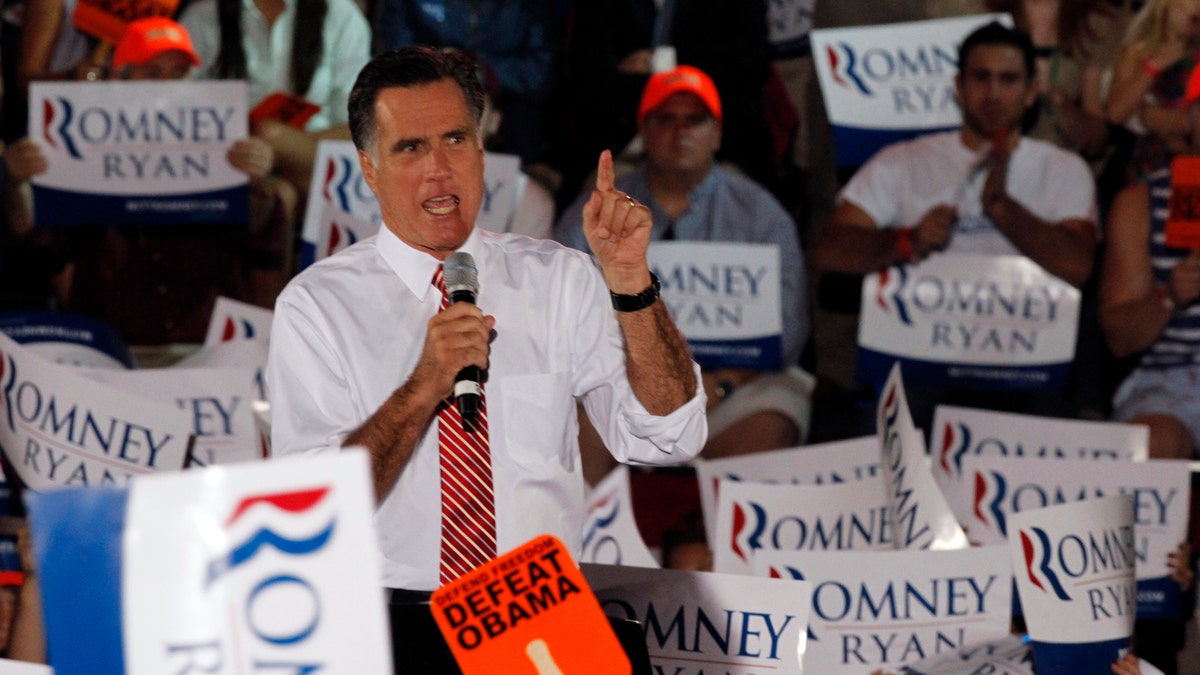
Republican presidential candidate Mitt Romney, gestures during a rally in Fishersville, Va., Thursday, Oct. 4, 2012.(AP Photo/Steve Helber) (AP2012)
The 2012 election will be about the jobs and economy. To the extent that foreign policy is on voters’ minds, developments in Iran, Libya, Iraq and Afghanistan will dominate the discussion.
US foreign policy in Latin America, a region much closer to home, will not receive as much attention – but it should.
As much is at stake in Latin America to the cause of global security and economic freedom as any other region on earth, and Mitt Romney and Barack Obama would take US policy in two radically different directions.
Even with the Cold War in the rear view mirror, there is a “free world” and a “less free world.” While Communism has largely been deposited on history’s ash heap, the international theatre is still littered with autocrats, theocrats and dictators who use national security, egalitarianism and other ostensibly good reasons to stand in the way of freedom of opportunity and self-determination for millions of people.
In Latin America, a violent anti-American gang of Bolivarians led by Venezuela’s Hugo Chavez and Cuba’s Raul Castro are subverting personal and economic freedom across the region, and have extended an olive branch to the likes of Iran and Hezbollah.
Violence related to drug cartels is pandemic, extending northward to our southern border with Mexico and in many cases spilling over the Rio Grande.
Latin American nations like Colombia and Brazil, which have achieved a fragile political stability, look to the United States for essential leadership and public support in the face of these internal and external threats.
In Barack Obama, they’ve found an American President who assails our allies, appeases our enemies and apologizes for America.
When presented with free trade agreements with Colombia and Panama, Obama sat on them for three years before submitting them to Congress for ratification last October. Obama delayed the opportunity to promote free enterprise in Chavez’ backyard as an early election season concession to powerful Union President Richard Trumka, who had opposed the agreement with Colombia.
Just as Obama abandoned our allies in Poland by unilaterally dismantling the US missile shield as part of some fanciful “reset” with Russia, Obama unilaterally loosened sanctions on Cuba without negotiating any reform from the Cuban government in return. In doing so, the President pandered to Cuban-American voters while abandoning their family members behind the Castros’ iron curtain.
In Barack Obama, they’ve found an American President who assails our allies, appeases our enemies and apologizes for America.
The Obama Administration’s plan to dismantle Mexican drug cartels centered around the foolhardy gambit of allowing low-level drug runners to purchase assault weapons illegally, hoping to track the guns back to cartel commanders. The only fruits of the “Fast and Furious” scandal are thousands of guns in the hands of the cartels, one of which was used to murder an American border patrol agent, and strained relations with both Mexico and the larger region.
In Latin America, Barack Obama has projected the image of a weak-willed and naïve leader. He has tried in vain to appease our enemies and turned his back on our allies, who are likewise turning their backs on us.
When Obama went to Brazil this January to personally lobby for purchasing rights to Brazil’s 38 billion barrels of oil, he was turned away. Brazil opted instead to sell the oil to China.
Unwavering American support for allies in tough neighborhoods enables those allies to deal confidently with bullies abroad and instill free market capitalism and democratic governance at home.
Obama never got that. Mitt Romney does.
That’s why Romney has pledged to, within 100 days of taking office, launch the Campaign for Economic Opportunity in Latin America, which will promote democracy and free trade throughout the region.
Romney has also proposed a new Hemispheric Joint Task Force on Crime and Terrorism to share intelligence and coordinate law enforcement to combat international criminal organizations, particularly drug cartels.
The hope for freedom of opportunity around the world requires a strong American President on the world stage: one not afraid to articulate the differences between a free society driven by individuals, and a totalitarian society driven by the state.
The Obama foreign policy has been marred by political correctness and naïveté; relations with many key allies have been strained.
Under President Romney, forces for personal and economic freedom will know that they have a friend in the White House. The enemies of freedom will know that, too. Latin America, and indeed the world, will be the better for it.




